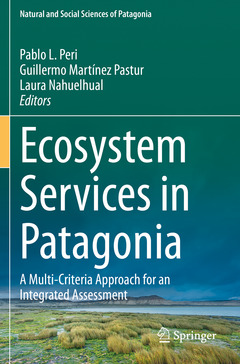Chapter 1 - Ecosystem services as a tool for decision-making in Patagonia
Chapter 2- Assessment of provisioning ecosystem services in terrestrial ecosystems of Santa Cruz province, Argentina
Chapter 3 - Grazing management and provision of ecosystem services in Patagonian arid rangelands
Chapter 4 - Synergies and trade-offs among ecosystem services and biodiversity in different forest types inside and off-reserve in Tierra del Fuego, Argentina
Chapter 5 - Shrubland management in northwestern Patagonia: an evaluation of its short-term effects on multiple ecosystem services
Chapter 6 - Silvopastoral systems in northern Argentine-Chilean Andean Patagonia: Ecosystem services provision in a complex territory
Chapter 7 - Ecosystem services values of the northwestern Patagonian natural grasslands
Chapter 8 - The ecosystem services provided by peatlands in Patagonia
Chapter 9 - Restoration for provision of ecosystem services in Patagonia-Aysén, Chile
Chapter 10 - The North American beaver invasion and the impact over the ecosystem services in the Tierra del Fuego archipelago
Chapter 11 - Social links for a nexus approach from an ecosystem services perspective in Central-East Patagonia
Chapter 12 - Salmon farming: is it possible to relate its impact to the waste remediation ecosystem service?
Chapter 13 - Using the ecosystem services approach to understand the distributional effects of marine protected areas in the Chilean Patagonia
Chapter 14 - Socio-cultural valuation of ecosystem services in Southern Patagonia, Argentina
Chapter 15 - Looking beyond ecosystem services supply: co-production and access barriers in marine ecosystems of the Chilean Patagonia
Chapter 16 - Ecosystem services and human well-being: a comparison of two Patagonian social-ecological systems
Chapter 17 - Urban Planning In Arid Northern Patagonia Cities To Maximize Local Ecosystem Services Provision
Chapter 18 - Land size, native forests and ecosystem services inequalities in the rural Chilean Patagonia
Chapter 19 - Imaginaries, transformations and resistances in Patagonian territories from a socio-ecological perspective
Chapter 20 - The challenges of implementing ecosystem services in the Argentinean and Chilean Patagonia
Chapter 21 - Natural capital and local employment in Argentine Patagonia
Chapter 22 - Ecosystem services in Patagonia: a synthesis and future directions.




